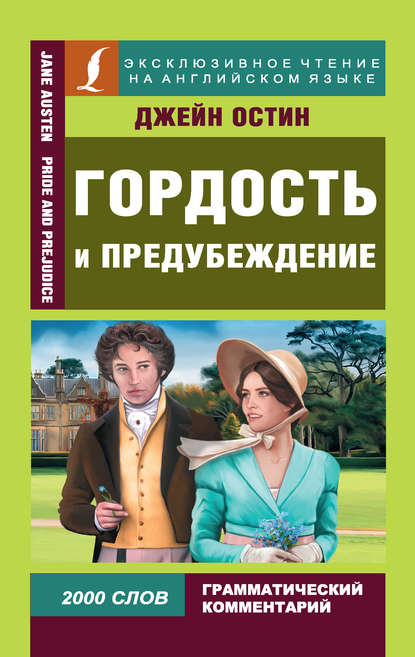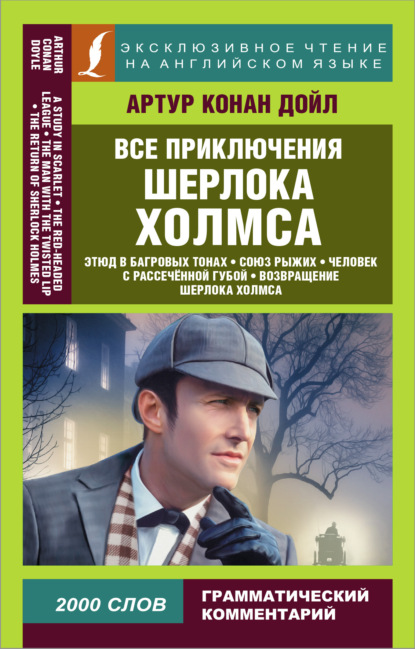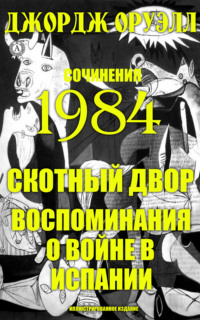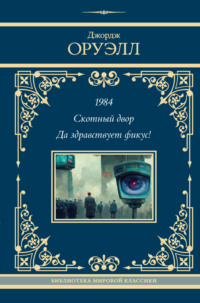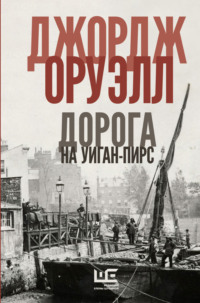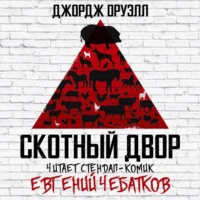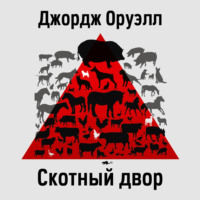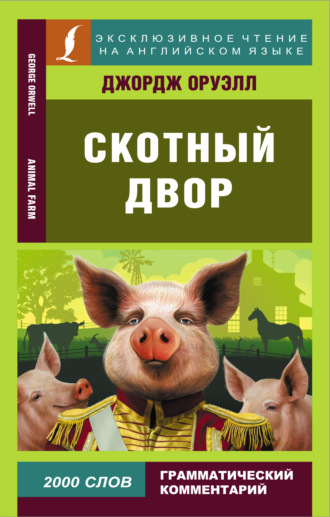
Полная версия
Скотный двор / Animal Farm

Джордж Оруэлл
Скотный двор / Animal Farm
© Матвеев С.А., 2021
© ООО «Издательство АСТ», 2021
Chapter I
Mr. Jones, of the Manor Farm[1], locked the hen-houses for the night. But he was too drunk to remember to shut the pop-holes[2]. He drew himself a last glass of beer from the barrel in the scullery, and made his way up to bed, where Mrs. Jones was already snoring.
As soon as the light in the bedroom went out there was a fluttering all through the farm buildings. They said during the day that old Major, the prize boar, had a strange dream and wished to communicate it to the other animals. The animals will all meet in the big barn as soon as Mr. Jones is gone. Old Major (so he was always called, though his name was Willingdon Beauty) was so highly regarded on the farm that everyone was quite ready to lose an hour’s sleep in order to listen to him.
At one end of the big barn, on a raised platform, Major was already ensconced on his bed of straw, under a lantern which hung from a beam. He was twelve years old and was stout, but he was still a majestic-looking pig, with a wise and benevolent appearance in spite of his tushes[3]. Soon the other animals began to arrive and make themselves comfortable. First came the three dogs, Bluebell, Jessie, and Pincher, and then the pigs, who settled down in the straw immediately in front of the platform. The hens perched themselves on the window-sills, the pigeons fluttered up to the rafters, the sheep and cows lay down behind the pigs and began to chew the cud.
The two cart-horses, Boxer and Clover, came in together, walking very slowly and setting down their vast hairy hoofs with great care. Clover was a stout motherly mare. Boxer was an enormous beast, nearly eighteen hands high, and as strong as two ordinary horses. A white stripe down his nose gave him a stupid appearance, and in fact he was not very intelligent. But he was universally respected for his steadiness of character and tremendous powers of work.
After the horses came Muriel, the white goat, and Benjamin, the donkey. Benjamin was the oldest animal on the farm, and the worst tempered. He seldom talked, and when he did, it was usually to make some cynical remark. For instance, he said:
«God gave him a tail to keep the flies off, but I prefer to have no tail and no flies».
Among the animals on the farm he never laughed. He said he saw nothing to laugh at. Nevertheless, he was devoted to Boxer. They usually spent their Sundays together in the small paddock beyond the orchard, grazing side by side and never speaking.
The two horses lay down when a brood of ducklings, which lost their mother, filed into the barn, cheeping feebly and wandering from side to side to find some place. Clover made a sort of wall round them with her great foreleg, and the ducklings nestled down inside it and promptly fell asleep.
At the last moment Mollie, the foolish, pretty white mare who drew Mr. Jones’s trap, came daintily in, chewing at a lump of sugar. She took a place near the front and began flirting her white mane, hoping to draw attention to her red ribbons.
Last of all came the cat, who looked round, as usual, for the warmest place, and finally squeezed herself in between Boxer and Clover. There she purred contentedly throughout Major’s speech without listening to a word of what he was saying.
All the animals were now present except Moses, the tame raven, who slept on a perch behind the back door. When Major saw that they all made themselves comfortable and were waiting attentively, he cleared his throat and began:
«Comrades, you heard already about the strange dream that I had last night. But I will come to the dream later. I have something else to say first. I do not think, comrades, that I shall be with you for many months longer. Before I die, I feel it my duty to pass on to you such wisdom as I have acquired. I have had a long life, I have had much time for thought as I lay alone in my stall, and I think I may say that I understand the nature of life on this earth as well as any animal now living. It is about this that I wish to speak to you.
Now, comrades, what is the nature of this life of ours? Let us face it: our lives are miserable, laborious, and short. We are born, they give us food just to keep the breath in our bodies. Those of us who are capable of it must to work to the last atom of our strength. The very instant that our usefulness has come to an end they slaughter us with hideous cruelty. No animal in England knows the meaning of happiness or leisure after he is a year old. No animal in England is free. The life of an animal is misery and slavery: that is the plain truth.
But is this simply part of the order of nature? Is it because this land of ours is so poor that it cannot afford a decent life to those who dwell upon it? No, comrades, a thousand times no! The soil of England is fertile, its climate is good, it is capable of affording food in abundance to an enormously greater number of animals than now inhabit it. This single farm of ours can support a dozen horses, twenty cows, hundreds of sheep – and all of them can live in a comfort and a dignity that we can’t imagine at the moment. Why then do we continue in this miserable condition? Because human beings steal nearly the whole of the produce of our labour. There, comrades, is the answer to all our problems. The key is a single word – Man. Man is the only real enemy we have. Remove Man from the scene, and the root cause of hunger and overwork is abolished for ever.
Man is the only creature that consumes and does not produce anything. He does not give milk, he does not lay eggs, he is too weak to pull the plough, he cannot run fast enough to catch rabbits. Yet he is lord of all the animals. He sets them to work[4], he gives back to them the bare minimum that will prevent them from starving. The rest he keeps for himself. Our labour tills the soil, our dung fertilises it, and yet there is not one of us that owns more than his bare skin. You cows that I see before me, how many thousands of gallons of milk did the man give you last year? And what has happened to that milk which was for the sturdy calves? Every drop of it has gone down the throats of our enemies.
And you hens, how many eggs have you laid in this last year? How many of those eggs ever hatched into chickens? The rest have all gone to market to bring in money for Jones and his men. And you, Clover, where are those four foals you bore, who could be the support and pleasure of your old age? Each was sold at a year old – you will never see one of them again. In return for your four confinements and all your labour in the fields, what have you ever had except your bare rations and a stall?
And even the miserable lives we lead are not allowed to reach their natural span. For myself I do not grumble, for I am one of the lucky ones. I am twelve years old and have had over four hundred children. Such is the natural life of a pig. But no animal escapes the cruel knife in the end.
You young porkers who are sitting in front of me, every one of you will scream your lives out at the block within a year. To that horror we all must come – cows, pigs, hens, sheep, everyone. Even the horses and the dogs have no better fate. You, Boxer, the very day that those great muscles of yours lose their power, Jones will sell you to the knacker. And the knacker will cut your throat and boil you down for the foxhounds[5]. As for the dogs, when they grow old and toothless, Jones ties a brick round their necks and drowns them in the nearest pond.
Is it not crystal clear, then, comrades, that all the evils of this life of ours spring from the tyranny of human beings? Only get rid of Man, and the produce of our labour will be our own! Almost overnight we can become rich and free. What then must we do? Why, work night and day, body and soul, for the overthrow of the human race! That is my message to you, comrades: Rebellion! I do not know when that Rebellion will come, in a week or in a hundred years, but I know, as surely as I see this straw beneath my feet, that sooner or later justice will be done. Fix your eyes on that, comrades, throughout the short remainder of your lives! And above all, pass on this message of mine to those who come after you, so that future generations will carry on the struggle until it is victorious.
And remember, comrades, your resolution must never falter. No argument must lead you astray. Never listen when they tell you that Man and the animals have a common interest, that the prosperity of the one is the prosperity of the others. It is all lies. Man serves the interests of no creature except himself. And among us animals let there be perfect unity, perfect comradeship in the struggle. All men are enemies. All animals are comrades!»
At this moment there was a tremendous uproar. While Major was speaking four large rats crept out of their holes and were sitting on their hindquarters, listening to him. The dogs suddenly caught sight of them, and it was only by a swift dash for their holes that the rats saved their lives. Major raised his trotter for silence.
«Comrades,» he said, «here is a point that must be settled. The wild creatures, such as rats and rabbits – are they our friends or our enemies? Let us put it to the vote. I propose this question to the meeting: Are rats comrades?»
They voted. It was agreed by an overwhelming majority that rats were comrades. There were only four dissentients, the three dogs and the cat. Afterwards it was discovered that the cat voted on both sides.
Major continued:
«I have little more to say. I merely repeat, remember always your duty of enmity towards Man and all his decisions. Whatever goes upon two legs is an enemy. Whatever goes upon four legs, or has wings, is a friend. And remember also that in fighting against Man, we must not come to resemble him. Even when you conquer him, do not adopt his vices. No animal must ever live in a house, or sleep in a bed, or wear clothes, or drink alcohol, or smoke tobacco, or touch money, or engage in trade. All the habits of Man are evil. And, above all, no animal must ever tyrannise animals. Weak or strong, clever or simple, we are all brothers. No animal must ever kill any other animal. All animals are equal.
And now, comrades, I will tell you about my dream of last night. I cannot describe that dream to you. It was a dream of the earth as it will be when Man vanishes. But it reminded me of something. Many years ago, when I was a little pig, my mother and the other sows sang an old song. Last night, it came back to me in my dream. And what is more, the words of the song also came back. The animals of long ago sang these words, I am certain. I will sing you that song now, comrades. I am old and my voice is hoarse. But when I teach you the tune, you can sing it better for yourselves. It is called ‘Beasts of England’.»
Old Major cleared his throat and began to sing. He sang well enough, and it was a wonderful tune, something between ‘Clementine’ and ‘La Cucaracha’. The words ran:
ppp
Beasts of England, beasts of Ireland,
Beasts of every land and clime,
Hearken to my joyful tidings
Of the golden future time.
Soon or late the day is coming,
Tyrant Man will be overthrown,
And the fruitful fields of England
Will be trod by beasts alone.
Rings will vanish from our noses,
And the harness from our back,
Bit and spur will rust forever,
Cruel whips no more will crack.
Riches more than mind can picture,
Wheat and barley, oats and hay,
Clover, beans, and mangel-wurzels[6]
Will be ours upon that day.
Bright will shine the fields of England,
Purer will its waters be,
Sweeter yet will blow its breezes
On the day that sets us free.
For that day we all must labour,
Though we die before it break;
Cows and horses, geese and turkeys,
All must toil for freedom’s sake.
Beasts of England, beasts of Ireland,
Beasts of every land and clime,
Hearken well and spread my tidings
Of the golden future time!
The singing of this song threw the animals into the wildest excitement. Almost before Major reached the end, they began to sing it for themselves. Even the stupidest of them picked up the tune and few words, and as for the clever ones, such as the pigs and dogs, they had the entire song by heart within a few minutes. And then, after a few preliminary tries, the whole farm burst out into ‘Beasts of England’ in tremendous unison. The cows lowed it, the dogs whined it, the sheep bleated it, the horses whinnied it, the ducks quacked it. They were so delighted with the song that they sang it five times in succession.
Unfortunately, the uproar awoke Mr. Jones, who sprang out of bed. He was sure that there was a fox in the yard. He seized the gun which always stood in a corner of his bedroom, and shot six times into the darkness. The pellets buried themselves in the wall of the barn and the meeting broke up hurriedly. Everyone fled to his own sleeping-place. The birds jumped on to their perches, the animals settled down in the straw, and the whole farm was asleep in a moment.
Chapter II
Three nights later old Major died peacefully in his sleep. His body was buried at the foot of the orchard.
This was early in March. During the next three months there was much secret activity. Major’s speech gave to the more intelligent animals on the farm a completely new outlook on life. They did not know when the Rebellion predicted by Major would take place. They had no reason to think that it would be within their own lifetime. But they saw clearly that it was their duty to prepare for it. The work of teaching and organizing the others fell naturally upon the pigs, who were the cleverest of the animals. Pre-eminent among the pigs were two young boars named Snowball and Napoleon. Mr. Jones was breeding them up for sale.
Napoleon was a large, fierce-looking Berkshire boar, the only Berkshire on the farm, not a talker, but with a reputation. Snowball was a more vivacious pig than Napoleon, quicker in speech and more inventive, but did not have the same depth of character. All the other male pigs on the farm were porkers. The best known among them was a small fat pig named Squealer[7], with very round cheeks, twinkling eyes, nimble movements, and a shrill voice. He was a brilliant talker. When he was arguing some difficult point he was skipping from side to side and whisking his tail which was very persuasive. They said that Squealer could turn black into white.
These three elaborated old Major’s teachings into a complete system of thought, to which they gave the name of Animalism. Several nights a week, after Mr. Jones was asleep, they held secret meetings in the barn and expounded the principles of Animalism to the others. At the beginning they met with much stupidity and apathy. Some of the animals talked of the duty of loyalty to Mr. Jones, whom they referred to as «Master». They made elementary remarks such as «Mr. Jones feeds us. If he is gone, we shall starve to death[8]».
Others asked such questions as «Why should we care what happens after we are dead?» or «If this Rebellion happens anyway, what difference does it make whether we work for it or not?» The pigs had great difficulty in making them see that this was contrary to the spirit of Animalism. Mollie, the white mare asked the stupidest questions of all. The very first question she asked Snowball was:
«Will there still be sugar after the Rebellion?»
«No,» said Snowball firmly. «We can’t make sugar on this farm. Besides, you do not need sugar. You will have all the oats and hay you want.»
«And will I still wear ribbons in my mane?» asked Mollie.
«Comrade,» said Snowball, «those ribbons of yours are the badge of slavery. Can you not understand that liberty is worth more than ribbons?»
Mollie agreed, but she did not sound very convinced.
The pigs had an even harder struggle to counteract the lies put about by Moses, the tame raven. Moses, who was Mr. Jones’s especial pet, was a spy and a tale-bearer. But he was also a clever talker. He knew of the existence of a mysterious country called Sugarcandy Mountain[9], to which all animals went when they died. It was situated somewhere up in the sky, a little distance beyond the clouds, Moses said. In Sugarcandy Mountain it was Sunday seven days a week, clover was in season all the year round, and lump sugar and linseed cake grew on the hedges. The animals hated Moses because he told tales and did no work. But some of them believed in Sugarcandy Mountain, and the pigs argued very hard to persuade them that there was no such place.
Their most faithful disciples were the two cart-horses, Boxer and Clover. These two had great difficulty in thinking. But they accepted the pigs as their teachers, and then they absorbed everything that the pigs told them. These horses passed it on to the other animals by simple arguments. They were the first animals at the secret meetings in the barn, and led the singing of ‘Beasts of England’, with which the meetings always ended.
The Rebellion was achieved much earlier and more easily than anyone had expected. In past years Mr. Jones, although a hard master, was a capable farmer. But now evil days arrived. He became much disheartened. He lost money in a lawsuit, and was drinking much. For whole days he was lounging in his chair in the kitchen, reading the newspapers, drinking, and occasionally feeding Moses on crusts of bread. His men were idle and dishonest, the fields were full of weeds, the buildings ruined, the hedges were neglected, and the animals were underfed.
June came and the hay was almost ready for cutting. On Midsummer’s Eve, which was a Saturday, Mr. Jones went into Willingdon and got so drunk[10] at the Red Lion that he did not come back till midday on Sunday. The workers milked the cows in the early morning and then went out. They did not feed the animals. When Mr. Jones got back he immediately went to sleep on the drawing-room sofa with the newspaper over his face. When evening came, the animals were still hungry. At last they could stand it no longer[11].
One of the cows broke in the door of the store-shed with her horn and all the animals began to help themselves from the bins. It was just then that Mr. Jones woke up. The next moment he and his four men were in the store-shed with whips in their hands. This was more than the hungry animals could bear.
They flung themselves upon their tormentors. The animals butted and kicked Jones and his men from all sides. The situation was quite out of their control. This sudden uprising of animals whom they thrashed and maltreated, frightened them a lot. Soon the men gave up, they were trying to defend themselves. A minute later all five of them were in the cart-track that led to the main road. The animals were pursuing them in triumph.
Mrs. Jones looked out of the bedroom window. She saw what was happening, hurriedly flung a few possessions into a carpet bag, and slipped out of the farm. Moses sprang off his perch and flapped after her, croaking loudly. Meanwhile the animals chased Jones and his men out on to the road and slammed the five-barred gate behind them. And so Jones was expelled, and the Manor Farm was theirs.
For the first few minutes the animals could hardly believe in their good fortune. Their first act was to gallop round the boundaries of the farm to make sure that no human being was hiding anywhere upon it. Then they raced back to the farm buildings to wipe out the last traces of Jones’s hated reign.
The harness-room at the end of the stables was broken open. The bits, the nose-rings, the dog-chains, the cruel knives with which Mr. Jones castrated the pigs and lambs, were all flung down. The reins, the halters, the blinkers were thrown on to the rubbish fire which was burning in the yard. So were the whips. All the animals capered with joy when they saw the whips in flames. Snowball also threw on to the fire the ribbons with which the horses’ manes and tails were usually decorated on market days.
«Ribbons,» he said, «are clothes, which are the mark of a human being. All animals must go naked.»
When Boxer heard this he fetched the small straw hat which he wore in summer to keep the flies out of his ears, and flung it on to the fire.
Soon the animals destroyed everything that reminded them of Mr. Jones. Napoleon then led them back to the store-shed and served out a double ration of corn to everybody, with two biscuits for each dog. Then they sang ‘Beasts of England’ seven times, and after that they settled down for the night and slept peacefully.
But they woke at dawn as usual, and suddenly remembered the glorious victory. So they all raced out into the pasture together. A little way down the pasture there was a knoll. The animals rushed to the top of it and gazed round them in the clear morning light. Yes, it was theirs – everything that they could see was theirs! In the ecstasy of that thought they gambolled round and round, they hurled themselves into the air in great leaps of excitement. They rolled in the dew, they cropped mouthfuls of the sweet summer grass, they kicked up clods of the black earth and snuffed its rich scent. Then they made a tour of inspection of the whole farm and surveyed with speechless admiration the ploughland, the hayfield, the orchard, the pool, the spinney. They could hardly believe that it was all their own.
Then they came back to the farm buildings and halted in silence outside the door of the farmhouse. That was theirs too, but they were frightened to go inside. After a moment, however, Snowball and Napoleon butted the door open with their shoulders and the animals entered. They tiptoed from room to room, afraid to speak loudly and gazing with awe at the unbelievable luxury, at the beds with their feather mattresses, the looking-glasses, the horsehair sofa, the carpet, the lithograph of Queen Victoria over the drawing-room mantelpiece. They were just coming down the stairs when Mollie disappeared.
They went back and found that she was in the best bedroom. She took a piece of blue ribbon from Mrs. Jones’s dressing-table, and was holding it against her shoulder and admiring herself in the glass in a very foolish manner. The others reproached her sharply, and they went outside. The animals took some hams from the kitchen to bury them. Boxer’s hoof kicked the barrel of beer in the scullery. They did not touch anything in the house. The farmhouse will be a museum. All were agreed that no animal must ever live there.
The animals had their breakfast, and then Snowball and Napoleon called them together again.
«Comrades,» said Snowball, «it is half-past six and we have a long day before us. Today we begin the hay harvest. But there is another matter.»
The pigs now revealed that during the past three months they were teaching themselves to read and write from an old book which belonged to Mr. Jones’s children. Napoleon sent for pots of black and white paint and led the way down to the gate. Then Snowball (Snowball was the best writer) took a brush between the two knuckles of his trotter, painted out MANOR FARM from the top bar of the gate and in its place painted ANIMAL FARM. This was the name of the farm from now onwards.
After this they went back to the farm buildings, where Snowball and Napoleon sent for a ladder. They set it against the end wall of the big barn. They explained that by their studies of the past three months the pigs reduced the principles of Animalism to Seven Commandments. These Seven Commandments will now be inscribed on the wall. They will form an unalterable law by which all the animals on Animal Farm must live for ever after.
With some difficulty (for it is not easy for a pig to balance himself on a ladder) Snowball climbed up and set to work. Squealer was holding the paint-pot[12]. The Commandments were written on the tarred wall in great white letters. They ran thus:




